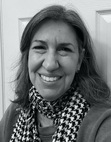Embracing The Writing Life: The Courage To Let Our Light Shine

Our deepest fear is not that we are inadequate. Our deepest fear is that we are powerful beyond measure. It is our light, not our darkness that most frightens us. We ask ourselves, Who am I to be brilliant, gorgeous, talented, fabulous? Actually, who are you not to be? You are a child of God. Your playing small does not serve the world. There is nothing enlightened about shrinking so that other people won’t feel insecure around you. We are all meant to shine, as children do. We were born to make manifest the glory of G-d that is within us. It’s not just in some of us; it’s in everyone. And as we let our own light shine, we unconsciously give other people permission to do the same. As we are liberated from our own fear, our presence automatically liberates others.
~Marianne Williamson
An Important Realization For WritersI’ve come across the above quote from Marianne Williamson many times over the years. I’ve read A Return to Love, the book from which the quote is taken, and recently I’ve realized that the quote is speaking to me in a deeper way than it has in the past.
One thing that most writers, or most creatives really, have to come to terms with is the fact that others are not always happy for you when good things happen. The quote from Williamson speaks to something I’ve struggled with—the part that feels like I should dim my light. Williamson says, “Your playing small does not serve the world. There is nothing enlightened about shrinking so that other people won’t feel insecure around you.”
Whatever success I’ve found in my life, I’ve worked hard for. I’ve been writing and editing for more than 20 years. I worked hard to write a dissertation that added something new to the scholarly discussion on storytelling, creativity, and identity. I worked my tail off to complete every aspect of my Ph.D.
Who Does She Think She Is?My guess, based on my own experience, is that some people feel like other people’s accomplishments are a reflection of them somehow. I’ve had the “Who does she think she is?” response more times than I can count.
Once, a friend at work was happy for me when a local magazine featured an article about my writing. She posted a link to the article on our work message board. As soon as I saw her post, I thought, “Oh no. This isn’t going to be good.” I knew from previous experience that other people’s reactions would not be positive.
After my friend posted the link, a few people went to her with the old “Who does she think she is?” line. When some of them started the “Who do you think you are?” with me, I said that whatever I’ve achieved it’s because I’ve worked hard. Was that the right response? I certainly don’t know. Writing and editing are how I choose to spend my free time. I felt like I had to explain away the fact that I received attention for my writing so others would know that I don’t think I’m “all that.”
The same friend who seemed happy for me when the article was published apparently decided that the Ph.D. was one achievement too many. The last time I saw her, I was at her house with another friend and we were talking about my conflicting opinions about the direction my career was taking. She said, mimicking as if she were speaking as me, “I know I’m better than everyone else.”
I’m generally quiet and keep to myself. I’m a highly sensitive introvert, and I also have a hearing loss that makes it hard to speak to others sometimes. I don’t think I’m better than anyone else. I think I work hard at certain pursuits, and as a result, sometimes good things happen. My accomplishments don’t negate anyone else’s accomplishments. There isn’t a limited amount of success in this world. My accomplishments don’t mean that there are fewer successes available for others.
There have been times when I’ve slunk around, my head hung low, avoiding eye contact with anyone. Then, in moments of clarity, I ask myself why I’m hiding away.
Why do I feel the need to explain away my successes when I don’t expect anyone else to explain away their successes? There have been times when I’ve allowed others to make me feel small, but that’s my fault, not theirs. People can have whatever reactions they want. It’s up to me to remember, as Williamson says, to “make manifest the glory of G-d that is within us.”
Seeking External ValidationThe “Who does she think she is?” issue becomes a problem when we seek external acknowledgment or validation. Once we realize that we don’t need anyone else’s approval, we are free from the labels others want to thrust upon us. If others disapprove, they are allowed to have their opinions. But we don’t have to accept their opinions as our own.
According to Rabbi Alan Lew, “Quite often people’s negative responses to us are rooted in their own twisted psychologies and not in anything we have done or said to provoke them.”
There’s an episode of Jay Shetty’s podcast On Purpose With Jay Shetty called “4 Reasons We Crave External Validation.” That episode spoke to me on a gut level. Shetty says that when we have a more grounded and supported sense of who we are, we are more likely to have an accurate understanding of ourselves. We have a stronger sense of self, and therefore we are less likely to be swayed by the opinions of others.
Shetty uses the example of Bruce Lee, who came to a similar conclusion while he was filming The Green Hornet. Lee realized that he was acting like a robot, trying to gain external validation by moving and speaking the way he thought he was expected to instead of the way he normally would. At that moment, Lee learned the importance of being yourself and not imitating others.
According to Shetty’s blog, “You don’t have to defend who you are in this world. You are not responsible for what others think of you. Your responsibility is to live in a way that adheres to your values and priorities. You can use input from others to help calibrate your thoughts and actions, but do not rely on them for your sense of self. Live your truth. It will defend itself.”
I have learned this lesson again and again. When I work hard, I’m manifesting the glory of G-d that is within me. According to Williamson, “And as we let our own light shine, we unconsciously give other people permission to do the same. As we are liberated from our own fear, our presence automatically liberates others.”
Amen.



